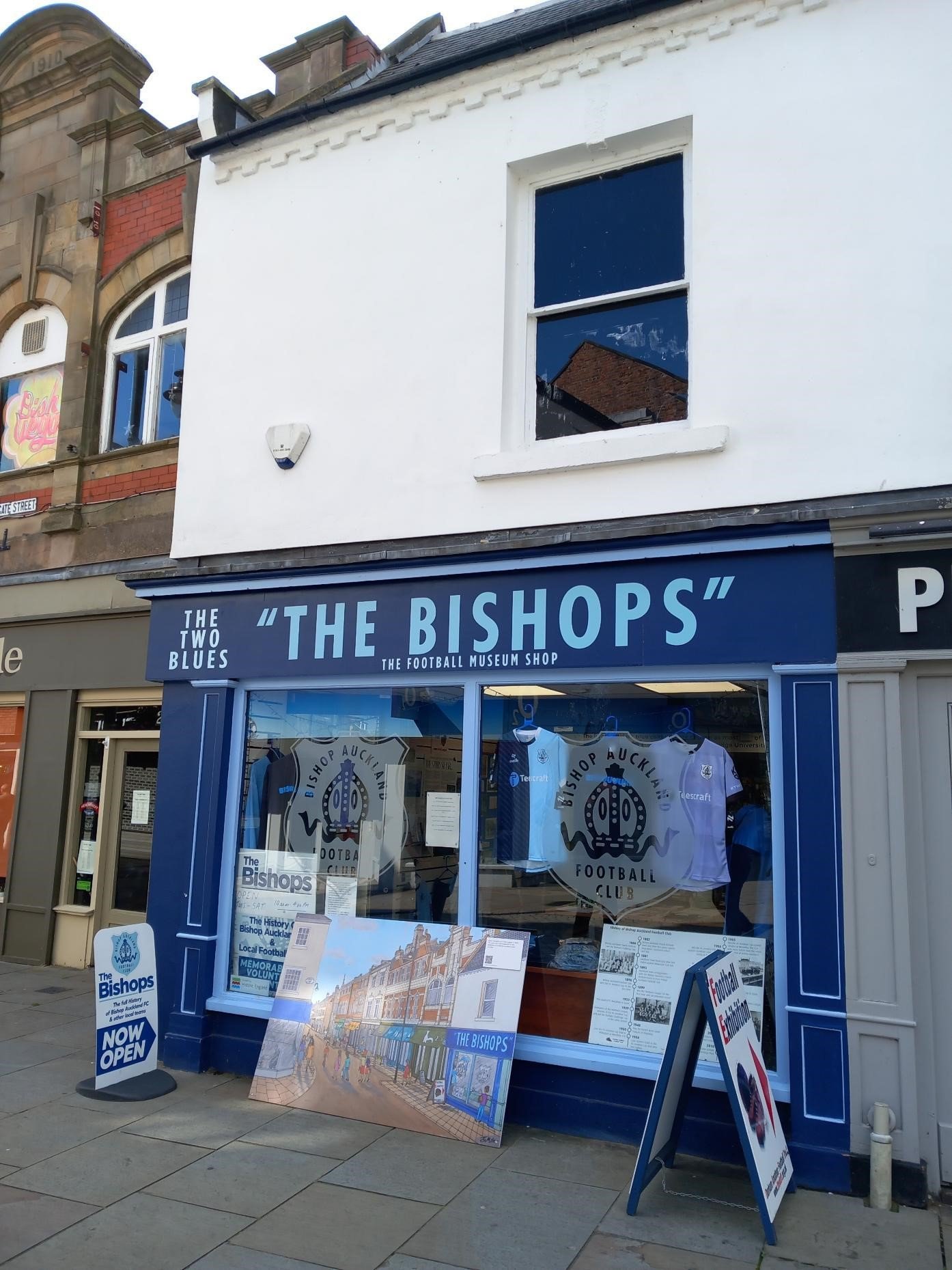Bishop Auckland: Supporting Community Heritage Projects
A powerful fascination with the history of amateur football in County Durham has led to the reuse of an empty high street shop to celebrate the heritage of Bishop Auckland Football Club.
The Bishops Shop was created through the Bishop Auckland Heritage Action Zone (HAZ) and has quickly become something of a local institution.
Celebrating the legacy of Bishop Auckland Football Club
The Bishops Shop was devised by Steve Coulthard, retired businessman and club chairman, who describes the premises as a ‘shop museum’.
Steve has brought together a rich collection of amateur footballing artefacts and stories and given it a prominent, if temporary, home on the town’s main square, Market Place.
Creating such a high-profile focus for local sporting pride has unleashed a flood of memorabilia held in the community, with people gifting silverware, caps, programmes and more to the collection, all helping to fly the flag.
The project is genuinely grassroots, growing from Steve’s idea. “We made it up as we went along,” he says, “and it grew into a museum in little more than 3 months.”
A chat with his councillor led Steve to Anne Allen, the Bishop Auckland HAZ Project Manager part-funded by Historic England. Anne quickly joined the dots: a community heritage initiative with enthusiastic backers, the need for ‘meanwhile uses’ in a town centre littered with empty shops, a cooperative landlord, and HAZ funds.
Steve was keen on one particular shop as it features in heroic photographs of thousands of townsfolk celebrating the club’s multiple FA Amateur Cup wins from the 1890s to the 1940s.
Local community works together to create the ‘shop museum’
A short rent-free lease was struck, which appealed to the landlord while he planned for the future. Business rate relief meant the only facilities costs are energy, which Steve has astutely covered through donations.
The property was eligible for a capital grant but it was in good condition, so instead Anne creatively used community engagement funds to support around £5,000 of shop signs, a paint-job, consents and other costs. A powerful community engagement tool began to be unlocked.
Inside, a local business fitted lighting for free and rich new displays were added including huge wall graphics that were key to turning an empty shop in to something more immersive.
Everything is in the club’s rousing two-blue colours said to stem from the famed Oxford and Cambridge blues. Back in 1882, the club began as a side founded by Oxbridge theology students studying at Auckland Castle.
We made it up as we went along, and it grew into a museum in little more than 3 months.
The Bishops opens to the public attended by celebrated past players
The shop quietly got going during the summer of 2021. It was formally opened with great fanfare on Friday 26 November by Bob Thursby, one of the club’s most celebrated past players, and Dick Longstaff, club historian and secretary of Durham Amateur Football Trust, who sadly died in 2023.
Upwards of a dozen volunteers now run The Bishops Shop, many of them retired local men who love the social side of things. “They are our heart and soul,” says Steve of his volunteers, “the diamonds keeping us going day to day.”
They have learned new skills, such as how to tell a canny story, and take great pride in keeping the memories alive and sharing them with new audiences. The place opens 5 days a week and is liveliest on match days with supporters reliving past glories and predicting future fortunes.
Community benefits and project challenges
Membership of both the Durham Amateur Football Trust, founded by Longstaff in 2005, and the supporters’ club have grown since the shop opened.
The neighbouring café, The Fox’s Tale, also grant-aided by the HAZ, has benefitted from increased footfall, too.
Online radio station Bishop FM has promoted the project but there is not yet an online presence, meaning younger football fans are an untapped opportunity.
Success has set up something of a challenge for the future. “We’re currently both bursting at the seams and too small to grow,” says Steve.
Such an exciting project in what was only meant to be a temporary venue poses many questions. Can the shop museum stay in this building? How could it cover rent if the lease cannot be extended? Would another, less high profile spot in town break the spell? Must the project wind-up altogether?
Thoughts for the future
Steve would love to grow in to the first floor, perhaps with a café, space for groups to meet, have football singalongs, show films of the club’s most illustrious matches, or perform plays such as Bishop United, which tells the story of Bishop Auckland FC’s pivotal role in rebuilding Manchester United’s team following the 1958 Munich air disaster.
There is great potential in properly curating the collection and using it for strong community development around a tradition so important to local working class culture. Keeping it high profile in town and connecting it with more established museums and archives could also bring benefits.
Talking team tactics has never been so crucial to championing the project’s future prospects.





